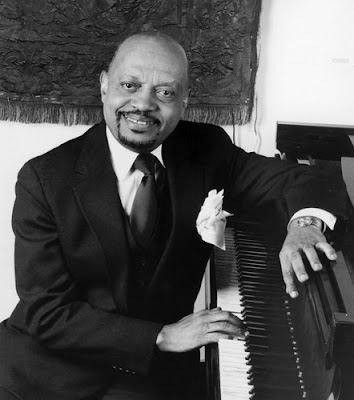"Donald Shirley around 1985. His works melded American and European traditions and exhibited a vast musical erudition." (Brownie Harris/New York Times)
Trumpeter Wilmer Wise sent the link to this story, along with this comment:
"Donald Shirley actually lived in Carnegie Hall! What an artist! I still remember his performances with The Symphony of the New World."
The New York Times wrote in 2010:In Apartments Above Carnegie Hall, a Coda for Longtime Residents
By LIZ ROBBINS
Published: August 27, 2010
"The pianist Donald Shirley, 83, made an appropriately dramatic exit; at the end of June, Mr. Shirley’s grand piano was lifted by crane out of his 12th-floor apartment."
New York Times
By BRUCE WEBER
Published: April 28, 2013
Donald Shirley, a pianist and composer who gathered classical music with jazz and other forms of popular music under a singular umbrella after being discouraged from pursuing a classical career because he was black, died on April 6 at his home in Manhattan. He was 86.
His death, which was not widely reported at the time, was caused by complications of heart disease, said Michiel Kappeyne van de Coppello, a friend who studied piano with Mr. Shirley.
A son of Jamaican parents, Mr. Shirley was a musical prodigy who played much of the standard concert repertory by age 10 and made his professional debut with the Boston Pops at 18, performing Tchaikovsky’s Piano Concerto No. 1 in B-flat minor.
But when he was in his 20s, he told his family and friends, the impresario Sol Hurok advised him to pursue a career in popular music and jazz, warning him that American audiences were not willing to accept a “colored” pianist on the concert stage.
Thus derailed, Mr. Shirley took to playing at nightclubs and invented what amounted to his own musical genre. First as part of a duo with a bassist and later as the leader of the Don Shirley Trio, featuring a bassist and a cellist — an unusual instrumentation suggesting the sonorities of an organ — he produced music that synthesized popular and classical sounds. He often melded American and European traditions by embedding a well-known melody within a traditional classical structure.
...
“He had a love-hate relationship with jazz,” Mr. Kappeyne van de Coppello said.
Still, he was close to many well-known jazz figures, including Duke Ellington, in whose honor he wrote “Divertimento for Duke by Don,” a symphonic work that had its premiere in 1974, performed by the Hamilton Philharmonic Orchestra of Ontario. His other orchestral works include a tone poem inspired by James Joyce’s “Finnegans Wake.”
[Duke Ellington (1899-1974) is featured at AfriClassical.com]

















0 comments:
Post a Comment